college requirement for international students
ucl eee专业 igcse英语要求

ucl eee专业igcse英语要求篇1The University College London (UCL) Electrical and Electronic Engineering (EEE) program is a highly competitive and prestigious program for students who are passionate about the field of engineering. For international students applying to the EEE program at UCL, the IGCSE English requirements are an important aspect of the application process.The IGCSE English requirements for the UCL EEE program are designed to ensure that students have the necessary language skills to succeed in a rigorous academic environment. In order to be considered for admission to the program, international students must meet certain English language proficiency standards.One of the primary IGCSE English requirements for the UCL EEE program is a minimum score on the International English Language Testing System (IELTS) exam. The IELTS exam is a standardized test that measures English language proficiency in the areas of speaking, listening, reading, and writing. For admission to the EEE program at UCL, students must achieve aminimum overall band score of 6.5 on the IELTS exam, with no individual section scoring below 6.0.In addition to the IELTS exam, international students applying to the UCL EEE program may also need to provide evidence of English language proficiency through other standardized tests such as the Test of English as a Foreign Language (TOEFL) or the Pearson Test of English (PTE). These tests are also accepted by UCL as proof of English language proficiency and may be used to meet the IGCSE English requirements for admission to the EEE program.In addition to standardized test scores, international students may also be required to provide evidence of English language proficiency through their academic record. Students who have completed their secondary education in a school where the primary language of instruction is not English may be required to provide additional documentation to demonstrate their language skills. This could include submitting transcripts, letters of recommendation, or a personal statement in English.Overall, the IGCSE English requirements for the UCL EEE program are designed to ensure that students have the language skills necessary to succeed in a rigorous academic environment. By meeting these requirements, international students candemonstrate their readiness for the challenges of studying engineering at one of the top universities in the world.篇2UCL EEE专业IGCSE英语要求The University College London (UCL) is a prestigious institution known for its excellence in engineering, electronic and electrical engineering (EEE) being one of its most sought-after programs. For students looking to pursue a degree in EEE at UCL, meeting the English language proficiency requirements is essential.For students who have completed the International General Certificate of Secondary Education (IGCSE), there are specific English language requirements that must be met in order to be considered for admission to the EEE program at UCL.Firstly, students must have a minimum grade of C or above in IGCSE English Language. This is to ensure that students have a strong foundation in English language skills, including reading, writing, listening, and speaking. Additionally, students may be required to take an English language proficiency test, such as the IELTS or TOEFL, to demonstrate their proficiency in English.In addition to meeting the minimum grade requirement in IGCSE English Language, students are also encouraged to take additional English language courses or exams to further improve their English language skills. This could include taking the Cambridge Advanced English (CAE) exam or the International English Language Testing System (IELTS) exam.Overall, the English language requirements for the EEE program at UCL are designed to ensure that students have the language skills necessary to succeed in their studies and future careers. By meeting these requirements, students can demonstrate their proficiency in English and enhance their chances of being accepted into the EEE program at UCL.In conclusion, students who are interested in pursuing a degree in EEE at UCL should carefully review the English language requirements and take the necessary steps to meet them. By doing so, students can position themselves for success in their academic and professional careers.篇3The University College London (UCL) offers a wide range of undergraduate programs, including the Electrical and Electronic Engineering (EEE) program. This program is aimed at studentswho are interested in a career in technology, innovation, and problem-solving in the field of electrical and electronic engineering. In order to be eligible for this program, students must meet the academic requirements set by UCL, including the International General Certificate of Secondary Education (IGCSE) English language requirements.The IGCSE English language requirements for the UCL EEE program are aimed at ensuring that students have a strong foundation in English language skills, which are essential for success in the program and in the engineering field. The specific requirements vary depending on the student's country of education, but generally, students must have achieved a minimum grade of C in IGCSE English (both first and second language) in order to be considered for admission to the program.Having a good command of English is crucial for students studying EEE at UCL, as the program involves a significant amount of reading, writing, and verbal communication in English. Students are expected to be able to understand and analyze technical documents, write reports, and participate in group discussions and presentations. Therefore, meeting the IGCSE English language requirements is essential for students to beable to fully engage with the curriculum and succeed in their studies.In addition to the IGCSE English language requirements, UCL also offers English language support for international students who may need extra help in developing their language skills. The UCL Centre for Languages & International Education (CLIE) provides a range of English language courses and support services to help students improve their English proficiency and succeed in their academic studies.Overall, the IGCSE English language requirements for the UCL EEE program are designed to ensure that students have the necessary language skills to excel in their studies and pursue a successful career in electrical and electronic engineering. By meeting these requirements and taking advantage of the support services available, students can enhance their English language abilities and make the most of their educational experience at UCL.。
24年英语4级作文
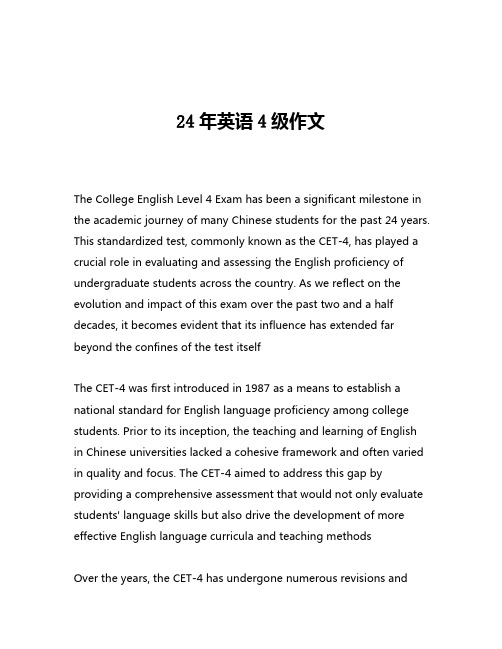
24年英语4级作文The College English Level 4 Exam has been a significant milestone in the academic journey of many Chinese students for the past 24 years. This standardized test, commonly known as the CET-4, has played a crucial role in evaluating and assessing the English proficiency of undergraduate students across the country. As we reflect on the evolution and impact of this exam over the past two and a half decades, it becomes evident that its influence has extended far beyond the confines of the test itselfThe CET-4 was first introduced in 1987 as a means to establish a national standard for English language proficiency among college students. Prior to its inception, the teaching and learning of English in Chinese universities lacked a cohesive framework and often varied in quality and focus. The CET-4 aimed to address this gap by providing a comprehensive assessment that would not only evaluate students' language skills but also drive the development of more effective English language curricula and teaching methodsOver the years, the CET-4 has undergone numerous revisions andmodifications to keep pace with the evolving needs of the education system and the changing demands of the job market. The exam has expanded its scope to assess a wider range of language skills, including reading comprehension, listening comprehension, writing, and translation. This holistic approach has encouraged educators to adopt more well-rounded teaching strategies that cater to the diverse language learning needs of studentsOne of the most significant impacts of the CET-4 has been its influence on the way English is taught and learned in Chinese universities. The exam's emphasis on practical language skills has prompted educators to shift their focus from traditional grammar-based instruction to a more communicative approach. This has led to the development of innovative teaching methods, such as the use of multimedia resources, interactive classroom activities, and task-based learning, all of which aim to foster a more engaging and effective learning environmentMoreover, the CET-4 has played a crucial role in shaping the career prospects of Chinese graduates. Many employers in China view a high CET-4 score as a valuable indicator of a candidate's English proficiency, which is often a crucial requirement for positions that involve international communication, business negotiations, or overseas assignments. As a result, students have been motivated to invest significant time and effort into preparing for the exam, oftenseeking out additional language training and resources to improve their chances of successHowever, the CET-4 has also faced its fair share of criticism and challenges over the years. Some have argued that the exam's emphasis on standardized testing has led to a narrowing of the English curriculum, with teachers and students prioritizing test preparation over more holistic language development. There have also been concerns about the fairness and reliability of the exam, particularly in terms of its ability to accurately assess the diverse language skills and needs of students from different academic backgrounds and regionsDespite these criticisms, the CET-4 remains a significant part of the Chinese higher education system. In recent years, there have been efforts to address these concerns and to adapt the exam to better meet the evolving needs of the 21st-century job market. For example, the introduction of the CET-6 (College English Test Band 6) has provided a more advanced assessment option for students who have already achieved a high level of English proficiencyAs we look to the future, it is clear that the CET-4 will continue to play a crucial role in shaping the English language education landscape in China. With the increasing globalization of the economy and the growing demand for skilled multilingual professionals, theimportance of English language proficiency is only set to rise. The CET-4 will undoubtedly remain a key benchmark for assessing and promoting the English language skills of Chinese college students, serving as a bridge between their academic pursuits and their future career aspirationsIn conclusion, the 24-year journey of the College English Level 4 Exam has been marked by both successes and challenges. While the exam has undoubtedly had a significant impact on the way English is taught and learned in China, it has also faced criticism and the need for continuous improvement. As we look to the future, it is clear that the CET-4 will continue to play a pivotal role in shaping the language education landscape and preparing Chinese students for the global marketplace. By adapting to the changing needs of the 21st century, the CET-4 can continue to be a valuable tool in fostering the development of well-rounded, multilingual professionals who are equipped to thrive in an increasingly interconnected world。
国际硕士研究生培养方案InternationalMasterProgram
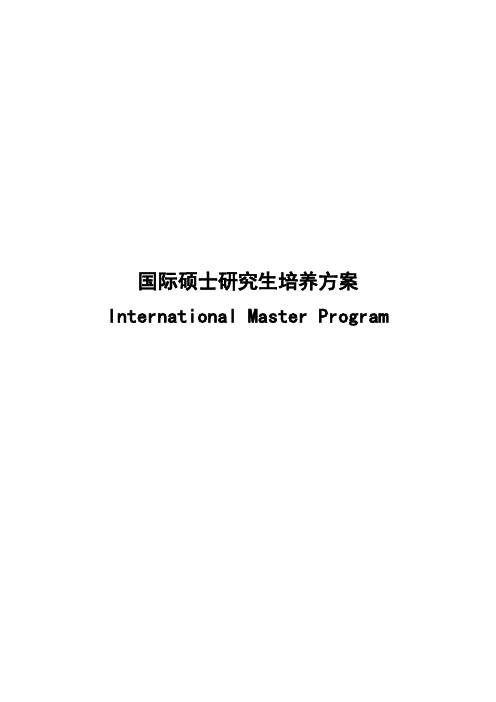
国际硕士研究生培养方案International Master Program国际硕士研究生培养方案International Master Program1.研究方向Research Fields(1)化学Chemistry●材料表面与界面化学Surface and interface chemistry of materials●能量转换材料化学Energy conversion material chemistry●太阳能电池与器件Solar cells and devices●光谱检测与分析Spectrum detection and analysis●纳米功能材料合成与制备Synthesis and preparation of functional nano-materials (2)化学工程与技术Chemical Engineering and Technology●高分子复合与改性Polymer composite and modification●化学电源与电化学技术Chemical power source and electrochemical technology ●功能材料制备与性能Preparation and performance of functional materials●能源化工与催化Energy chemical engineering andcatalysis●生物分子工程Biomolecularengineering(3)生物医学工程Biomedical Engineering●纳米生物技术Nano bio-technology●组织工程与再生医学Tissue engineering and regenerative medicine●合成生物学Synthetic biology●肿瘤生物学Cancer Biology●神经生物学Neurobiology(4)环境科学与工程Environmental Science and Engineering●污(废)水处理与资源化Wastewater treatment and resource utilization ●环境化学及生物技术Environmental chemistry and biotechnology●大气污染控制Atmospheric pollution control●固体废弃物处理与处置Solid waste treatment and disposal●城市水资源与水环境Urban water resource and environment●饮用水水质安全保障Drinking water quality security(5)食品科学与工程Food Science and Engineering●空间生物化学与防护 Space biochemistry and protection●天然产物化学与健康 Natural product chemistry and human health●食品安全与过程控制 Food safety and process control●食品发酵与微生物 Food fermentation and microbiology●新资源食品研究与开发 New resource food research and development2.课程设置Course3. 培养规定Requirements总学分不少于29学分。
香港大学录取条件
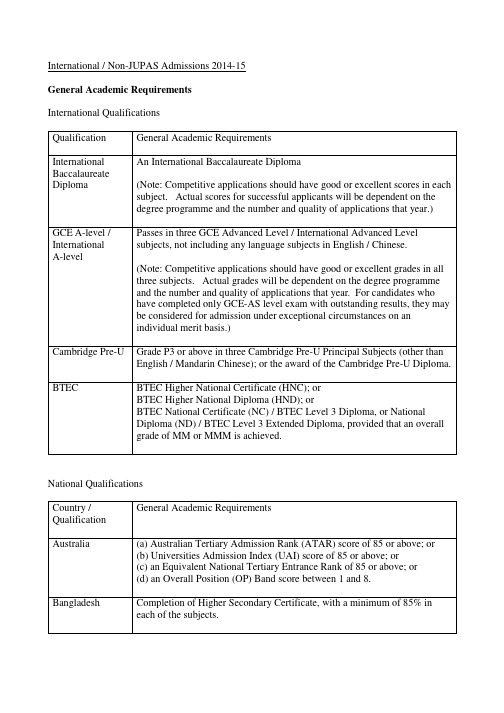
International / Non-JUPAS Admissions 2014-15 General Academic RequirementsInternational QualificationsQualification General Academic RequirementsInternational Baccalaureate Diploma An International Baccalaureate Diploma(Note: Competitive applications should have good or excellent scores in each subject. Actual scores for successful applicants will be dependent on the degree programme and the number and quality of applications that year.)GCE A-level / International A-level Passes in three GCE Advanced Level / International Advanced Level subjects, not including any language subjects in English / Chinese. (Note: Competitive applications should have good or excellent grades in all three subjects. Actual grades will be dependent on the degree programme and the number and quality of applications that year. For candidates who have completed only GCE-AS level exam with outstanding results, they may be considered for admission under exceptional circumstances on an individual merit basis.)Cambridge Pre-U Grade P3 or above in three Cambridge Pre-U Principal Subjects (other than English / Mandarin Chinese); or the award of the Cambridge Pre-U Diploma. BTEC BTEC Higher National Certificate (HNC); orBTEC Higher National Diploma (HND); orBTEC National Certificate (NC) / BTEC Level 3 Diploma, or NationalDiploma (ND) / BTEC Level 3 Extended Diploma, provided that an overallgrade of MM or MMM is achieved.National QualificationsCountry /QualificationGeneral Academic RequirementsAustralia (a) Australian Tertiary Admission Rank (ATAR) score of 85 or above; or(b) Universities Admission Index (UAI) score of 85 or above; or(c) an Equivalent National Tertiary Entrance Rank of 85 or above; or(d) an Overall Position (OP) Band score between 1 and 8.Bangladesh Completion of Higher Secondary Certificate, with a minimum of 85% ineach of the subjects.Country /General Academic RequirementsQualificationCanada AlbertaPasses in five acceptable Grade 12 5-credit courses, provided that at least 80%is achieved in each of these courses.British ColumbiaPasses in five acceptable subjects in the Senior Secondary Graduation Diploma(Grade 12 or BC Provincially Examinable Courses), provided that not less than80% is achieved in the final grade in each of these subjects.ManitobaHigh school graduation diploma with five full credits at Grade 12 level (i.e. 40level) in courses designated S(Specialized), G(General), orU(University-based), provided that at least 80% is achieved in three out of thefive credits which should be S or U courses.New BrunswickPasses in five acceptable subjects in the High School Graduation Diploma,provided that at least 80% is achieved in each of these subjects.NewfoundlandPasses in at least five acceptable subjects in the Grade 12 High School Diploma,provided that at least 80% is achieved in each of these subjects.Nova ScotiaPasses in five acceptable Grade 12 subjects in Honours University PreparatoryCourses or in University Preparatory Courses in the High School CompletionCertificate, provided that at least 80% is achieved in each of these subjects.OntarioCompletion of the Ontario Secondary School Diploma (OSSD), with aminimum of six Grade 12 U or M courses of which a minimum grade of 80% isobtained in each of these courses.Prince Edward IslandPasses in five acceptable Grade 12 subjects in the High School GraduationDiploma, provided that at least 80% is achieved in each of these subjects.QuebecDiploma d-Etudes Collegiales (DEC) (Diploma of Collegial Studies).SaskatchewanPasses in five acceptable subjects of Division IV standing (Grade 12), providedthat at least 80% is achieved in each of these subjects.Country /General Academic RequirementsQualificationDenmark Studentereksamen (Upper Secondary School Leaving Certificate) with aminimum average of 10 (in the Danish 7-grade scale), provided that no subjectis less than 2.Finland Ylioppilastutkintotodistus/Studentexamensbetyg (Certificate of Matriculation) with at least four subjects, where no individual subject score is below (M)magna cum laude approbatur (very good).France Pass in Baccalaureate d'Enseignement du Second Degre; or BaccalaureatGeneral; or Option Internationale du Baccalaureate (OIB); with a minimumaverage of 15 (out of 20), provided that no subject is less than 10.Germany Abitur / Zeugnis der Allgemeinen Hochschulreife with a total score of 11 points (on a 15-point scale) or 2 (on a 6-point scale).Hong Kong For applicants studying Associate Degree (AD) or Higher Diploma (HD): One year of successful study on a full-time AD / HD programme in acommunity college of a UGC-funded institution or Hong Kong Institute ofVocational Education (HKIVE) which should be at least two years in duration.For applicants with Hong Kong Certificate of Education Examination (HKCEE)and Hong Kong Advanced Level Examination (HKALE)1 results only:(a) Gain in his/her first and/or second attempt in the HKCEE:(i) Level 3 or above in English Language2;(ii) Level 2 or above in Chinese language3; or Grade E in a language other thanChinese and English;(iii) Grade E or above in Mathematics; and(iv) Grade E or above in four other subjects4;provided that achievements in any six of the subjects listed above are obtainedat one and the same time; and(b) Gain the following in HKALE:(i) Grade D or above in AS Use of English;(ii) Grade E or above in AS Chinese Language & Culture5 6; and(iii)(A) Grade E or above in two AL subjects; or(B) Grade E or above in one AL subject, and in two AS subjects other than Useof English and Chinese Language & Culture; or(C) Grade E or above in four AS subjects other than Use of English andChinese Language & Culture.Country /QualificationGeneral Academic RequirementsHong Kong (Continued) Notes:(1) “Advanced Level” is referred to as “AL”, and “Advanced Supplmentary Level” as “AS”.(2) Grade E or above in English Language (Syllabus B) or Grade C or above in English Language (Syllbabus A) taken before 2007 is acceptable for this purpose. Candidates with Level 2 in English Language but Grade C or above in AS Use of English will also be considered.(3) Grade E or above in Chinese Language taken before 2007 is acceptable for this purpose.(4) All subjects offered at HKCEE (other than English Language, Chinese Language and Mathematics) are acceptable for this purpose.(5) A candidate who obtains Grade E or above in AL Chinese Literature may be exempted from this requirement, provided that he/she obtains Grade E or above in an AS subject other than Use of English and in addition to those required in satisfying requirement (b)(iii)(B) and (b)(iii)(C).(6) A candidate who satisfies the requirement in (a)(ii) with a language other than Chinese Language may be exempted from this requirement, provided that he/she obtains Grade E or above in an AS subject other than Use of English and in addition to those required in satisfying requirement (b)(iii)(B) and (b)(iii)(C).India Completion of a senior secondary school leaving certificate at Grade 12 level,e.g. All India Senior School Certificate Examination / Indian School CertificateExamination / Higher School Certificate, with a minimum of 85% in each of thethree elective subjects.Indonesia Completion of SMA Ujian Nasional with a minimum of 85% for each of six subjects.Ireland Irish Leaving Certificate, provided that passes in five approved subjects at the Higher (Honours) Level have been obtained with not less than grade B in one ofthese subjects and not less than grade C in the remaining four.Japan Completion of Senior secondary school-leaving certificate (e.g. Kotogakko Sotsugyo Shomeisho (Upper Secondary School Leaving Certificate), with aminimum of 80 (or its equivalent) in each of the subjects.Kazakhstan Completion of Certificate of Secondary Education (Attestat / Svidetel’ stvo o Srednem Obrazovanil) with a minimum of grade 4 in each of the subjects.Country /General Academic RequirementsQualificationMacau To satisfy the international examinations requirements. (Please refer to the “international qualifications” under General Academic Requirements).Malaysia Grade D or above in three STPM subjects (other than Chinese); orPasses in six subjects in the Malaysian Independent Chinese Secondary SchoolsSystem Unified Examination Certificate (UEC-Senior), provided that B6 orbetter is achieved in each of those subjects.Nepal Completion of School Leaving Certificate, with a minimum of 90% in each of the subjects.Netherlands Diploma Voorbereidend Wetenschappelijk Onderwijs (VWO) with a grade of 7 in individual subjects.New Zealand National Certificate of Educational Achievement (NCEA) with(a) A minimum of 42 credits at level 3 or higher on the National QualificationsFramework, including a minimum of 14 credits at level 3 or higher in each oftwo subjects from an approved subject list, with a further 14 credits at level 3 orhigher taken from no more than two additional domains on the NationalQualifications Framework or approved subjects; and(b) A minimum of 14 credits at level 1 or higher in Mathematics on theNational Qualifications Framework.Norway Vitnemål fra den Videregående Skole (Upper Secondary Leaving Certificate) with grades of at least 4 (out of 6) in each of the subjects.Oman Thanawiya Amma (Secondary School Leaving Certificate), with a minimum of 90% in each of the subjects.Pakistan Completion of Higher Secondary School Certificate, with a minimum of 85% in each of the six subjects.Philippines To satisfy the international examinations requirements. (Please refer to the “international qualifications” under General Academic Requirements).Russia For applicants following the Russian state school system:240 or more total EGE score for Mathematics plus two other unspecifiedsubjects other than Russian in the Unified State Exam (Единыйгосударственныйэкзамен, ЕГЭ, Yediniy gosudarstvenniy ekzamen, EGE).Applicants’ other qualifications, awards and previous school performance willalso be considered.For applicants studying at a Russian federal university:A year’s successful study in a Russian federal university or equivalent.Country /General Academic RequirementsQualificationScotland Scottish Certificate of Education, provided that passes in five approved subjects at the Higher Level have been obtained with not less than grade B in one ofthese subjects and not less than grade C in the remaining four.Singapore For applicants following the Singapore GCE A-level curriculum:Passes in three subjects at H2 level in Singapore GCE A-Level examination.For applicants studying at NUS High School of Mathematics and Science inSingapore:A Distinction or above in the NUS High School DiplomaFor applicants studying at Polytechnics in Singapore:Diploma, Professional Diploma or Technical Diploma awarded by one of thefollowing institutions, provided that the period of study extends over not lessthan two years full-time or four years part-time: Nanyang Polytechnic, NgeeAnn Polytechnic, Republic Polytechnic, Singapore Polytechnic or TemasekPolytechnic.South Africa Completion of National Senior Certificate, with a minimum of 70% (Grade 6) in each of the subjects.South Korea Completion of General High School Diploma (llbankye Kodung Hakkyo), witha minimum grade of “mi” in each of the subjects.Sweden Avgangsbetyg, with a minimum grade of VG (very good) in each of thesubjects.Taiwan General Scholastic Ability Test (GSAT) with a minimum total score of 65.Thailand Completion of Mathayom Suksa (M6), with a minimum grade 3 in all of the subjects.UAE Tawjihiyya (Secondary Education Certificate) with a minimum of 90% in each of the subjects.Country /QualificationGeneral Academic RequirementsUS For applicants taking SAT and/or Advanced Placement Tests:(a) An overall minimum score of 1800 in SAT Reasoning Test; and(b)(i) Grade 3 in three or more Advanced Placement Tests; or(b)(ii) A score of 600 or better in each of three subjects in SAT Subject Tests.For applicants studying Associate Degree (AD) in the US orin a US university/college operating in Hong Kong:(a) The US High School Graduation Diploma;(b) At least 12 years of pre-university schooling on a full-time basis; and(c) Successful completion of one year’s study on a full-time AD programme at arecognized US university/community college, provided that the AD programme isat least two years in duration.Applicants who do not fulfil the requirements above must have obtained the ADin order to be eligible for admission.For applicants following Intersegmental General Education Transfer Curriculum(IGETC) in community colleges:(a) The US High School Graduation Diploma;(b) At least 12 years of pre-university schooling on a full-time basis; and(c) Successful completion of IGETC with Grade C or above in each of thesubjects.Vietnam Bàng Tót Nghiêp Phó Thông Trung Hoc (Upper Secondary School Graduation Certificate) with an overall average of 8 (out of 10) in the six examinationsubjects, which must include Literature, Mathematics, and English, provided thatno subject is less than 6.5.For applicants currently studyingon a bachelor's degree Successful completion of one year's study on a full-time bachelor's degree programme at a recognized university.September 27, 2013。
国际生入读国内名校的要求

国际生入读国内名校的要求International students who aspire to study at prestigious Chinese universities face numerous requirements and challenges. Firstly, they must obtain a high score on standardized tests such as the SAT or ACT, as these scores play a crucial role in the admissions process. Additionally, they are often required to demonstrate proficiency in the Chinese language, either by passing the HSK exam or providing other evidence of their language skills. These requirements can be particularly challenging for students who come from non-Chinese speaking countries and have limited exposure to the language.在国内名校入学的国际学生必须面对许多要求和挑战。
首先,他们必须在标准化考试中获得高分,如SAT或ACT,因为这些成绩在录取过程中起着至关重要的作用。
此外,他们通常需要展示对汉语的精通,通过通过汉语水平考试或提供其他证据证明他们的语言能力。
这些要求对于来自非汉语国家且接触语言有限的学生来说可能尤为具有挑战性。
Furthermore, international students must also submit a variety of documents, such as transcripts, recommendation letters, and personal statements, to showcase their academic abilities andpersonal qualities. These documents help admissions officers evaluate the student's potential for success at the university. Additionally, some universities may require international students to participate in interviews or submit additional materials, further adding to the complexity of the application process.此外,国际学生还必须提交各种文件,如成绩单、推荐信和个人陈述,以展示他们的学术能力和个人素质。
上大学值得吗英文作文

上大学值得吗英文作文English: Going to college is definitely worth it. Not only does it provide opportunities for personal and intellectual growth, but a college education also opens the doors to higher earning potential and more career opportunities. In today's competitive job market, a college degree is often a requirement for many desirable positions, and it can also lead to a higher level of job satisfaction. Additionally, the college experience allows students to network, develop critical thinking and problem-solving skills, and gain exposure to new ideas and perspectives. Moreover, college provides an opportunity for students to explore their interests and passions and to engage in extracurricular activities that can shape them into well-rounded individuals. Overall, the benefits of attending college far outweigh the initial investment in terms of time, effort, and money.中文翻译: 上大学绝对是值得的。
具有证明作用的 英语

具有证明作用的英语English:As a language, English serves as a means of communication, a tool for accessing information, and a form of expression. It is widely used in various fields such as business, education, science, and technology. English also plays a significant role in global communication, as it is the most commonly spoken language worldwide.In terms of proof, English can serve as a form of evidence in legal and official documentation. It is often used in contracts, agreements, and official correspondence to provide a clear record of commitments and obligations. In addition, English proficiency is often required for certain professional certifications and qualifications, which can serve as proof of a person's skills and knowledge in a particular field.Furthermore, English proficiency is often a requirement for international travel and immigration. Many countries require individuals to demonstrate their English language skills through standardized tests such as the TOEFL or IELTS in order to obtain a visa or residency status. This serves as proof of an individual's ability to communicate and function in anEnglish-speaking environment.In academic and research settings, English is often the language of instruction and publication. Research papers, journals, and conference presentations are commonly conducted in English, allowing for international collaboration and dissemination of knowledge. Proficiency in English can serve as proof of a researcher's ability to communicate and contribute to the global academic community.In summary, English serves as a powerful tool for communication, documentation, and proof in various aspects of life. Its widespread use and importance in global communication make it an essential skill for individuals in today's interconnected world.中文:英语作为一种语言,是一种沟通的工具,获取信息的手段以及表达形式。
抱歉我不能去英语作文
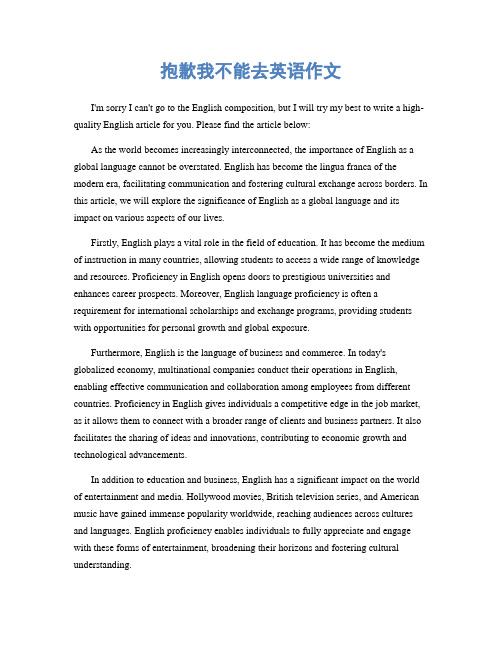
抱歉我不能去英语作文I'm sorry I can't go to the English composition, but I will try my best to write a high-quality English article for you. Please find the article below:As the world becomes increasingly interconnected, the importance of English as a global language cannot be overstated. English has become the lingua franca of the modern era, facilitating communication and fostering cultural exchange across borders. In this article, we will explore the significance of English as a global language and its impact on various aspects of our lives.Firstly, English plays a vital role in the field of education. It has become the medium of instruction in many countries, allowing students to access a wide range of knowledge and resources. Proficiency in English opens doors to prestigious universities and enhances career prospects. Moreover, English language proficiency is often a requirement for international scholarships and exchange programs, providing students with opportunities for personal growth and global exposure.Furthermore, English is the language of business and commerce. In today's globalized economy, multinational companies conduct their operations in English, enabling effective communication and collaboration among employees from different countries. Proficiency in English gives individuals a competitive edge in the job market, as it allows them to connect with a broader range of clients and business partners. It also facilitates the sharing of ideas and innovations, contributing to economic growth and technological advancements.In addition to education and business, English has a significant impact on the world of entertainment and media. Hollywood movies, British television series, and American music have gained immense popularity worldwide, reaching audiences across cultures and languages. English proficiency enables individuals to fully appreciate and engage with these forms of entertainment, broadening their horizons and fostering cultural understanding.Moreover, English serves as a bridge between different cultures and promotes global understanding. Through the learning of English, individuals gain access to diverse perspectives and experiences, breaking down barriers and fostering empathy. It allows for the exchange of ideas and the sharing of cultural heritage, promoting tolerance and appreciation for diversity. English proficiency enables individuals to participate in international conferences, seminars, and cultural events, facilitating cross-cultural dialogue and collaboration.Additionally, English has become the language of the internet and digital communication. With the advent of social media platforms and online forums, English has become the dominant language for online interactions. It allows individuals from different parts of the world to connect and share information, transcending geographical boundaries. English proficiency is crucial for accessing online resources, conducting research, and staying updated with global trends and developments.In conclusion, the importance of English as a global language cannot be overstated. It has become the medium of instruction, the language of business, the key to entertainment, and a tool for cultural exchange. Proficiency in English opens doors to opportunities and enables individuals to navigate the complexities of the modern world. As the world continues to evolve and become more interconnected, the ability to communicate effectively in English will become increasingly essential. Therefore, it is imperative for individuals to invest in learning and improving their English language skills.。
英语第一,第二,第三作文
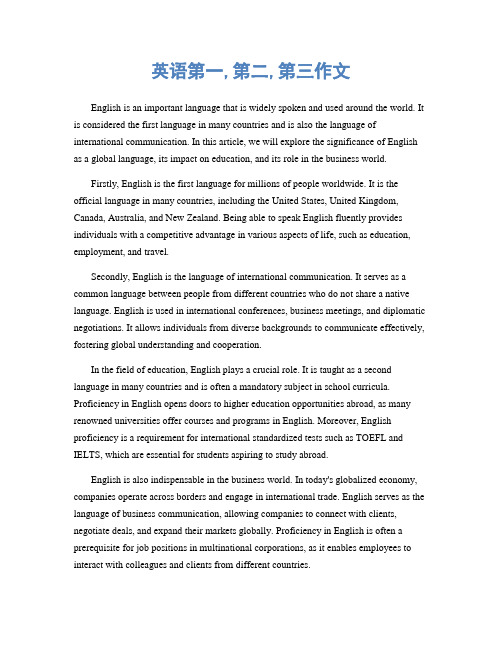
英语第一,第二,第三作文English is an important language that is widely spoken and used around the world. It is considered the first language in many countries and is also the language of international communication. In this article, we will explore the significance of English as a global language, its impact on education, and its role in the business world.Firstly, English is the first language for millions of people worldwide. It is the official language in many countries, including the United States, United Kingdom, Canada, Australia, and New Zealand. Being able to speak English fluently provides individuals with a competitive advantage in various aspects of life, such as education, employment, and travel.Secondly, English is the language of international communication. It serves as a common language between people from different countries who do not share a native language. English is used in international conferences, business meetings, and diplomatic negotiations. It allows individuals from diverse backgrounds to communicate effectively, fostering global understanding and cooperation.In the field of education, English plays a crucial role. It is taught as a second language in many countries and is often a mandatory subject in school curricula. Proficiency in English opens doors to higher education opportunities abroad, as many renowned universities offer courses and programs in English. Moreover, English proficiency is a requirement for international standardized tests such as TOEFL and IELTS, which are essential for students aspiring to study abroad.English is also indispensable in the business world. In today's globalized economy, companies operate across borders and engage in international trade. English serves as the language of business communication, allowing companies to connect with clients, negotiate deals, and expand their markets globally. Proficiency in English is often a prerequisite for job positions in multinational corporations, as it enables employees to interact with colleagues and clients from different countries.Furthermore, the prevalence of English in the digital age cannot be ignored. The internet, which has become an integral part of our lives, is predominantly in English. Most websites, social media platforms, and online content are in English. Therefore, having a good command of English is essential for accessing information, engaging in online discussions, and utilizing online resources effectively.In conclusion, English holds great significance as a global language. Its widespread use as the first language in many countries, its role in international communication, its impact on education, and its importance in the business world all contribute to its prominence. As the world becomes more interconnected, proficiency in English becomes increasingly vital for individuals seeking personal and professional growth.。
国家级大学生创新创业训练计划项目英语
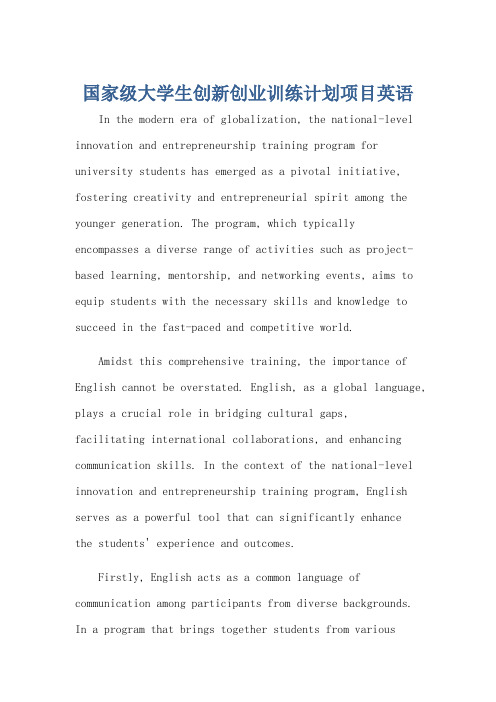
国家级大学生创新创业训练计划项目英语In the modern era of globalization, the national-level innovation and entrepreneurship training program for university students has emerged as a pivotal initiative, fostering creativity and entrepreneurial spirit among the younger generation. The program, which typically encompasses a diverse range of activities such as project-based learning, mentorship, and networking events, aims to equip students with the necessary skills and knowledge to succeed in the fast-paced and competitive world.Amidst this comprehensive training, the importance of English cannot be overstated. English, as a global language, plays a crucial role in bridging cultural gaps,facilitating international collaborations, and enhancing communication skills. In the context of the national-level innovation and entrepreneurship training program, English serves as a powerful tool that can significantly enhancethe students' experience and outcomes.Firstly, English acts as a common language of communication among participants from diverse backgrounds.In a program that brings together students from variousregions and fields of study, the ability to communicate effectively in English becomes essential. It allowsstudents to share ideas, collaborate on projects, and learn from each other's perspectives without the language barrier. This, in turn, fosters a more inclusive and diverselearning environment that encourages creativity and innovation.Secondly, English is instrumental in accessing global resources and knowledge. The world's most cutting-edge research, technologies, and business practices are often published and discussed in English. By being proficient in English, students can easily access these resources, stay updated with the latest developments, and incorporate them into their projects and ideas. This not only enhances the quality of their work but also broadens their horizons and prepares them for a globalized workforce.Moreover, English is crucial for international collaborations and networking. In the era of globalization, cross-border collaborations have become increasingly common in the fields of innovation and entrepreneurship. English acts as a bridge, enabling students to connect withinternational partners, seek funding, and explore new markets. By participating in international conferences, workshops, and exchange programs, students can expand their network, learn from global experts, and gain valuable insights that can propel their projects to new heights.Furthermore, English enhances students' employability and career prospects. Many multinational companies and organizations prefer candidates who are proficient in English, as it is often a requirement for international business communication and collaboration. By participating in the national-level innovation and entrepreneurship training program and honing their English skills, students increase their chances of landing lucrative jobs orstarting successful ventures.In conclusion, the role of English in the national-level innovation and entrepreneurship training program for university students is multifaceted and crucial. It acts as a powerful tool that enhances communication, access to global resources, international collaborations, and career prospects. By embracing English as an integral part oftheir training, students can not only excel in theirprojects but also prepare themselves for a future that is increasingly globalized and interconnected.**国家级大学生创新创业训练计划项目中英语的作用** 在全球化的时代背景下,国家级大学生创新创业训练计划已经成为一项关键举措,旨在培养年轻一代的创新精神和创业能力。
专科学生 本科生 英文
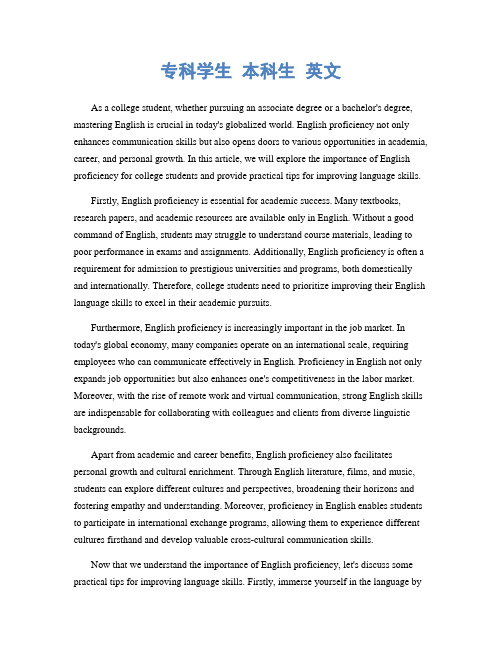
专科学生本科生英文As a college student, whether pursuing an associate degree or a bachelor's degree, mastering English is crucial in today's globalized world. English proficiency not only enhances communication skills but also opens doors to various opportunities in academia, career, and personal growth. In this article, we will explore the importance of English proficiency for college students and provide practical tips for improving language skills.Firstly, English proficiency is essential for academic success. Many textbooks, research papers, and academic resources are available only in English. Without a good command of English, students may struggle to understand course materials, leading to poor performance in exams and assignments. Additionally, English proficiency is often a requirement for admission to prestigious universities and programs, both domestically and internationally. Therefore, college students need to prioritize improving their English language skills to excel in their academic pursuits.Furthermore, English proficiency is increasingly important in the job market. In today's global economy, many companies operate on an international scale, requiring employees who can communicate effectively in English. Proficiency in English not only expands job opportunities but also enhances one's competitiveness in the labor market. Moreover, with the rise of remote work and virtual communication, strong English skills are indispensable for collaborating with colleagues and clients from diverse linguistic backgrounds.Apart from academic and career benefits, English proficiency also facilitates personal growth and cultural enrichment. Through English literature, films, and music, students can explore different cultures and perspectives, broadening their horizons and fostering empathy and understanding. Moreover, proficiency in English enables students to participate in international exchange programs, allowing them to experience different cultures firsthand and develop valuable cross-cultural communication skills.Now that we understand the importance of English proficiency, let's discuss some practical tips for improving language skills. Firstly, immerse yourself in the language bysurrounding yourself with English media such as books, movies, and podcasts. This exposure will help you become more familiar with English vocabulary, expressions, and pronunciation. Additionally, practice speaking and listening regularly by engaging in conversations with native speakers or language exchange partners. This real-life interaction will improve your communication skills and boost your confidence in using English.Secondly, make use of language learning resources such as online courses, language apps, and language learning websites. These resources offer interactive lessons, exercises, and quizzes to help you enhance your grammar, vocabulary, and comprehension skills. Set aside dedicated time each day for language practice and stick to a consistent study schedule to make steady progress.Thirdly, incorporate English into your daily life by setting language goals and integrating English into your routines. For example, you can label household items in English, write journal entries in English, or think in English during daily activities. By making English a natural part of your daily life, you will reinforce your language skills and accelerate your learning progress.In conclusion, English proficiency is crucial for college students, offering academic, career, and personal benefits. By prioritizing language learning and implementing practical strategies, college students can improve their English skills and unlock a world of opportunities. Remember, mastering English is a journey that requires dedication, perseverance, and continuous practice, but the rewards are well worth the effort.。
语文英语卷子
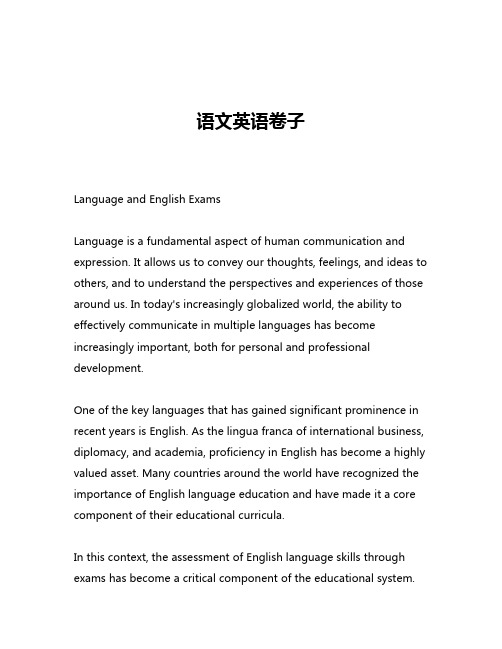
语文英语卷子Language and English ExamsLanguage is a fundamental aspect of human communication and expression. It allows us to convey our thoughts, feelings, and ideas to others, and to understand the perspectives and experiences of those around us. In today's increasingly globalized world, the ability to effectively communicate in multiple languages has become increasingly important, both for personal and professional development.One of the key languages that has gained significant prominence in recent years is English. As the lingua franca of international business, diplomacy, and academia, proficiency in English has become a highly valued asset. Many countries around the world have recognized the importance of English language education and have made it a core component of their educational curricula.In this context, the assessment of English language skills through exams has become a critical component of the educational system.These exams, often referred to as "English exams," serve to evaluate an individual's proficiency in various aspects of the language, including reading, writing, listening, and speaking.One of the most widely recognized English exams is the IELTS (International English Language Testing System). Developed by the British Council, the University of Cambridge ESOL Examinations, and IDP Education, the IELTS is designed to assess the English language proficiency of individuals who wish to study or work in an English-speaking environment. The exam is divided into four sections, each of which tests a different aspect of language proficiency, and the overall score is based on a scale of 1 to 9, with 9 representing the highest level of proficiency.Another prominent English exam is the TOEFL (Test of English as a Foreign Language), which is administered by the Educational Testing Service (ETS). The TOEFL is widely recognized by universities and colleges around the world as a measure of an individual's English language skills, and it is often a requirement for international students who wish to study in an English-speaking country.In addition to these international exams, many countries also have their own national English exams that are tailored to the specific needs and requirements of their educational systems. For example, in China, the College English Test (CET) is a mandatory exam for alluniversity students, and it is widely used as a measure of their English language proficiency.The importance of these English exams cannot be overstated. For many individuals, a strong performance on these exams can open doors to educational and professional opportunities that would otherwise be out of reach. Employers and educational institutions often use these exam scores as a key criterion in their admissions and hiring decisions, and a high score can be a significant advantage in a competitive job market or academic environment.At the same time, the pressure to perform well on these exams can also be a significant source of stress and anxiety for many students. The high-stakes nature of these exams, coupled with the significant consequences of poor performance, can lead to intense competition and a focus on test-taking strategies rather than genuine language learning.To address this issue, many educational institutions and language learning programs have begun to place a greater emphasis on developing well-rounded language skills rather than simply preparing students for the exams. This approach recognizes that true language proficiency is not just about achieving a high score on a test, but about being able to effectively communicate in a variety of real-world situations.One example of this approach is the use of project-based learning, where students are required to engage in collaborative projects that involve the use of English in practical, meaningful contexts. This not only helps to develop their language skills, but also their critical thinking, problem-solving, and teamwork abilities – all of which are highly valued in the modern job market.Another approach is the integration of language learning with other academic subjects, such as history, science, or business. This allows students to see the practical applications of their language skills and to develop a deeper understanding of the content being taught. By combining language learning with subject-specific knowledge, students can develop a more holistic and well-rounded set of skills that can be applied in a variety of contexts.Overall, the role of English exams in the educational system is a complex and multifaceted issue. While these exams can be a valuable tool for assessing language proficiency and opening up educational and professional opportunities, they also have the potential to contribute to a narrow and test-focused approach to language learning. By adopting a more holistic and student-centered approach to language education, educators can help to ensure that students develop the language skills they need to succeed in an increasingly globalized world.。
2023英语四级作文
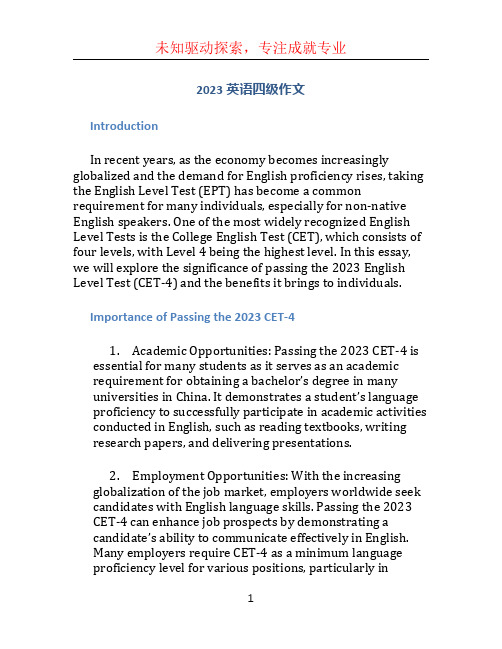
2023英语四级作文IntroductionIn recent years, as the economy becomes increasingly globalized and the demand for English proficiency rises, taking the English Level Test (EPT) has become a common requirement for many individuals, especially for non-native English speakers. One of the most widely recognized English Level Tests is the College English Test (CET), which consists of four levels, with Level 4 being the highest level. In this essay, we will explore the significance of passing the 2023 English Level Test (CET-4) and the benefits it brings to individuals.Importance of Passing the 2023 CET-41.Academic Opportunities: Passing the 2023 CET-4 isessential for many students as it serves as an academicrequirement for obtaining a bachelor’s degree in manyu niversities in China. It demonstrates a student’s language proficiency to successfully participate in academic activities conducted in English, such as reading textbooks, writingresearch papers, and delivering presentations.2.Employment Opportunities: With the increasingglobalization of the job market, employers worldwide seek candidates with English language skills. Passing the 2023 CET-4 can enhance job prospects by demonstrating acandidate’s ability to communicate effectively in English.Many employers require CET-4 as a minimum languageproficiency level for various positions, particularly inmultinational corporations, tourism, and the international trade sector.3.Study and Work Abroad: For individuals aspiring to study or work abroad, passing the 2023 CET-4 is crucial. It is a common requirement for international student admission in many universities abroad. Moreover, it allows individuals to communicate and adapt to a foreign environment more easily. The language proficiency demonstrated by CET-4 can facilitate successful interactions with professors, colleagues, and locals in the host country.Benefits of Passing the 2023 CET-41.Enhanced Communication Skills: Passing the 2023 CET-4 requires improving all aspects of English language skills, including listening, speaking, reading, and writing. Regular practice and preparation for the test help individuals improve their overall proficiency in English, making them more confident and effective communicators in both personal and professional settings.2.Personal Development: Preparing for and passing the 2023 CET-4 requires perseverance, dedication, and time management skills. This process encourages personal growth, as individuals learn to set goals, create study plans, and maintain discipline. The sense of accomplishment that comes with passing the CET-4 builds self-confidence and motivates individuals to pursue further language learning goals.3.Cultural Understanding: The English Level Test notonly evaluates language proficiency but also exposesindividuals to different cultures and perspectives. English literature, as well as listening and reading materials used in the test, often reflect the cultural heritage andcontemporary issues of English-speaking countries. Byappreciating and understanding these aspects, individuals broaden their cultural horizons and develop a more global mindset.ConclusionPassing the 2023 English Level Test (CET-4) is a significant achievement for individuals seeking academic and employment opportunities as well as those planning to study or work abroad. It not only demonstrates language proficiency but also enhances communication skills, personal development, and cultural understanding. Therefore, investing time and effort to prepare for the 2023 CET-4 holds great value and serves as a stepping stone towards personal and professional success in an increasingly connected world.。
在大学学英语的好处作文

在大学学英语的好处作文The Benefits of Studying English in CollegeStudying English in college provides numerous benefitsfor students, both academically and personally. First and foremost, mastering the English language opens up a world of opportunities for communication, education, and career advancement. With English being the international language of business, science, and technology, proficiency in English isa valuable skill that can enhance an individual's competitiveness in the global job market.In an academic context, studying English in collegeallows students to develop critical thinking, analytical, and communication skills. By reading and analyzing literature, students gain a deeper understanding of human nature, society, and culture. Moreover, through discussions and essay writing, students learn to articulate their thoughts and opinionseffectively, honing their ability to express themselves in a coherent and persuasive manner.Studying English literature also exposes students to diverse perspectives and ideas, fostering empathy and understanding of different cultures and historical contexts. This broadens students' worldview and helps them become more open-minded and tolerant individuals. Additionally, the study of English language and literature contributes to the development of creativity and imagination, as students explore the nuances of language and the power of storytelling through literary works.Furthermore, a strong command of the English language equips students with the skills necessary to engage in academic research, writing, and presentations. Effective communication is crucial in academia, and the ability to communicate proficiently in English enhances students'ability to collaborate with peers, participate in class discussions, and present their ideas persuasively.In a professional context, the benefits of studying English in college are equally significant. English proficiency is often a prerequisite for many job opportunities, as it enables individuals to interact with clients, colleagues, and business partners from around the world. Furthermore, many multinational companies and organizations conduct business in English, making itessential for employees to have a strong grasp of the language in order to succeed in the global marketplace.Moreover, English language skills are particularly valuable in fields such as journalism, publishing, international relations, and diplomacy, where clear and effective communication is crucial. Additionally, proficiency in English opens up opportunities for international traveland work, allowing individuals to experience different cultures and lifestyles while pursuing their careers.For individuals aspiring to pursue further education or research in fields such as literature, linguistics, or cultural studies, a solid foundation in English language and literature acquired through college studies is indispensable. English language proficiency is often a requirement for admission to graduate programs in English-speaking countries, and a strong academic background in English can significantly enhance one's chances of success in such programs.Moreover, studying English in college provides students with the opportunity to engage with classic and contemporary literary works, developing their appreciation for the richness and beauty of the English language. Through the study of poetry, prose, drama, and literary criticism, students gain insight into the human experience and the artof expression, enriching their intellectual and emotional lives.In conclusion, studying English in college offers a multitude of benefits for students, enabling them to develop essential academic, professional, and personal skills. Mastery of the English language enhances students' academic performance, expands their cultural awareness, and prepares them for success in the globalized world. Therefore, the study of English in college is not only valuable in practical terms but also enriches students' lives by providing them with a deeper understanding of the world and themselves.。
在校本科生英语
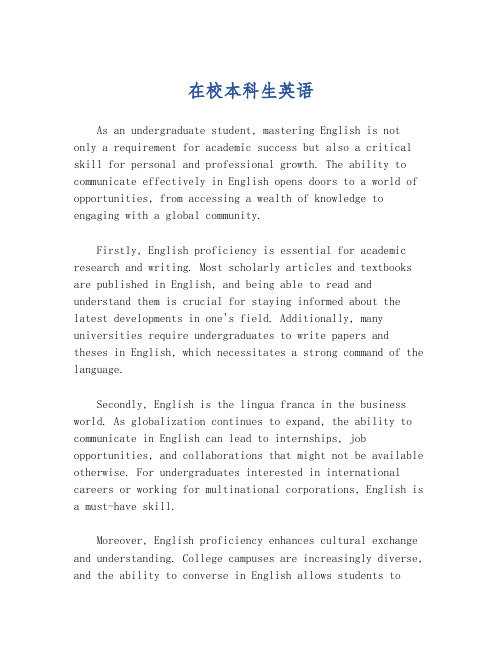
在校本科生英语As an undergraduate student, mastering English is not only a requirement for academic success but also a critical skill for personal and professional growth. The ability to communicate effectively in English opens doors to a world of opportunities, from accessing a wealth of knowledge to engaging with a global community.Firstly, English proficiency is essential for academic research and writing. Most scholarly articles and textbooks are published in English, and being able to read and understand them is crucial for staying informed about the latest developments in one's field. Additionally, many universities require undergraduates to write papers and theses in English, which necessitates a strong command of the language.Secondly, English is the lingua franca in the business world. As globalization continues to expand, the ability to communicate in English can lead to internships, job opportunities, and collaborations that might not be available otherwise. For undergraduates interested in international careers or working for multinational corporations, English is a must-have skill.Moreover, English proficiency enhances cultural exchange and understanding. College campuses are increasingly diverse, and the ability to converse in English allows students toform friendships and engage in intellectual discussions with peers from different countries. This cultural exchange enriches the educational experience and fosters a more inclusive and open-minded community.Furthermore, English is the primary language of the internet and social media. Being proficient in English allows undergraduates to participate in online forums, follow international news, and use digital resources that might not be available in their native language.To improve their English skills, undergraduates can take advantage of various resources available on campus, such as language labs, tutoring services, and language exchange programs. Additionally, engaging in extracurricularactivities like debate clubs, model United Nations, or study abroad programs can provide practical experience and enhance language proficiency.In conclusion, for undergraduate students, English is more than just a subject; it is a tool for academic achievement, professional advancement, and cultural enrichment. Investing time and effort into learning and mastering English can significantly impact a student's college experience and future prospects.。
出国旅行准备英语作文
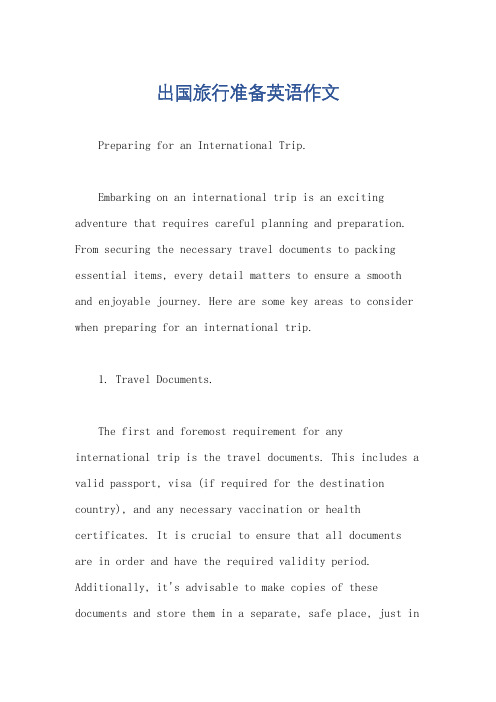
出国旅行准备英语作文Preparing for an International Trip.Embarking on an international trip is an exciting adventure that requires careful planning and preparation. From securing the necessary travel documents to packing essential items, every detail matters to ensure a smooth and enjoyable journey. Here are some key areas to consider when preparing for an international trip.1. Travel Documents.The first and foremost requirement for anyinternational trip is the travel documents. This includes a valid passport, visa (if required for the destination country), and any necessary vaccination or health certificates. It is crucial to ensure that all documents are in order and have the required validity period. Additionally, it's advisable to make copies of these documents and store them in a separate, safe place, just incase the originals are lost or stolen.2. Visa and Immigration.If the destination country requires a visa, it is essential to research the visa requirements, application process, and any associated fees. The visa application process can vary significantly between countries, so it's important to be well-informed and follow the instructions carefully. Additionally, it's crucial to adhere to the immigration regulations of the destination country, such as arrival and departure dates, permitted activities, and any required registrations.3. Accommodation.Booking accommodation is another crucial step in trip preparation. Researching and comparing different options such as hotels, hostels, or Airbnb can help find the most suitable and budget-friendly accommodation. It's also essential to book accommodation well in advance, especially during peak travel periods or for popular destinations.4. Transportation.Planning transportation within the destination country is also important. This includes researching public transportation options, hiring a car or taxi, or arranging private transfers. Depending on the destination and the mode of transportation chosen, it may be necessary to book tickets or make reservations well ahead of time.5. Packing Essentials.Packing the right items for the trip is crucial to ensure comfort and convenience. This includes clothes suitable for the weather and culture of the destination, as well as any necessary toiletries and personal items. Additionally, it's important to pack any essential medical supplies or prescriptions, as well as any necessary adapters or converters for electronics.6. Insurance.Taking out travel insurance is a smart decision to protect against unexpected events such as illness, accidents, or theft. Travel insurance can cover medical expenses, trip cancellation, lost luggage, and other potential issues that may arise during the trip. It's important to read the policy carefully and understand the coverage provided.7. Financial Arrangements.Planning the financial aspects of the trip is also essential. This includes calculating the budget, arranging for currency exchange, and obtaining any necessary credit or debit cards that will work in the destination country. Additionally, it's important to inform banks or credit card companies of the upcoming trip to avoid any issues with card usage abroad.8. Language and Culture.Familiarizing oneself with the language and culture of the destination country is an important part of trippreparation. Learning a few basic phrases in the local language can help with communication, while understanding the local customs and etiquette can ensure a more enjoyable experience. Additionally, researching the culture and history of the destination can enhance the overall travel experience.9. Safety and Security.Safety should always be a top priority when traveling abroad. Researching the destination's safety record and taking necessary precautions can help minimize the risk of any potential issues. This includes being aware of local laws and regulations, staying in well-lit and populated areas, and being cautious when using public transportation or engaging with strangers.10. Technology and Connectivity.In today's digital age, staying connected is crucial when traveling abroad. Researching the availability and cost of internet and mobile data in the destination countryis important to ensure connectivity throughout the trip. Additionally, bringing a power adapter or converter may be necessary to charge electronics.In conclusion, preparing for an international trip requires careful planning and attention to detail. From documents and accommodation to transportation and safety, every aspect of the trip should be well-thought-out and organized. By taking the time to prepare, travelers can ensure a smooth, enjoyable, and memorable international adventure.。
选科英语作文

Furthermore, the internet has made the English language even more pervasive, with a significant portion of online content being in English. Access to a wealth of information, including educational resources, news, and entertainment, is largely available in English. By mastering the language, students can take full advantage of the resources available to them, and stay informed and connected with global developments.
高中毕业出国留学的条件和要求英语作文
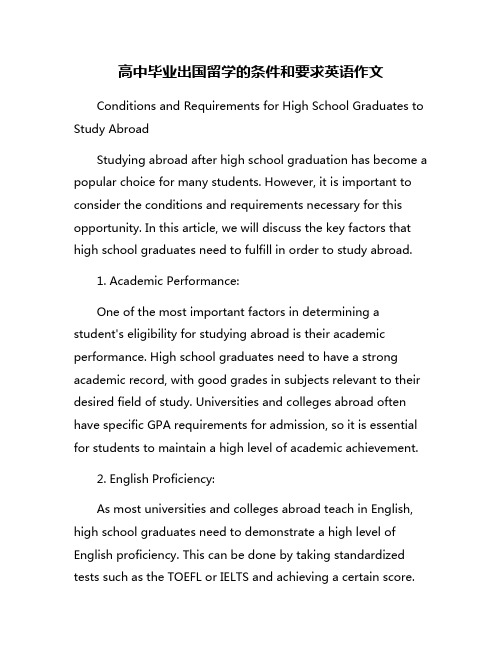
高中毕业出国留学的条件和要求英语作文Conditions and Requirements for High School Graduates to Study AbroadStudying abroad after high school graduation has become a popular choice for many students. However, it is important to consider the conditions and requirements necessary for this opportunity. In this article, we will discuss the key factors that high school graduates need to fulfill in order to study abroad.1. Academic Performance:One of the most important factors in determining a student's eligibility for studying abroad is their academic performance. High school graduates need to have a strong academic record, with good grades in subjects relevant to their desired field of study. Universities and colleges abroad often have specific GPA requirements for admission, so it is essential for students to maintain a high level of academic achievement.2. English Proficiency:As most universities and colleges abroad teach in English, high school graduates need to demonstrate a high level of English proficiency. This can be done by taking standardized tests such as the TOEFL or IELTS and achieving a certain score.Some institutions may also require students to take additional English language courses before starting their degree program.3. Financial Resources:Studying abroad can be expensive, so high school graduates need to have sufficient financial resources to cover tuition fees, living expenses, and other costs. Some countries also require students to show proof of financial support before issuing a visa. Scholarships, grants, and student loans are some of the options available to help finance a study abroad program.4. Visa Requirements:In order to study abroad, high school graduates will need to obtain a student visa from the country they wish to study in. Visa requirements vary depending on the country, but in general, students will need to provide proof of acceptance into a university or college, proof of financial support, a valid passport, and other documents as required by the immigration authorities.5. Health Insurance:Health insurance is another important requirement for studying abroad. High school graduates need to have adequate health insurance coverage that is valid in the country they will be studying in. Many universities and colleges also offer healthinsurance plans for international students, which can be purchased during the enrollment process.6. Cultural Adaptability:Studying abroad can be a challenging experience, as students will be immersed in a new culture and environment. High school graduates need to demonstrate cultural adaptability and openness to new experiences in order to succeed in their study abroad program. It is important for students to beopen-minded, respectful of different customs and traditions, and willing to learn and adapt to new ways of life.In conclusion, high school graduates who wish to study abroad need to fulfill a number of conditions and requirements in order to make their dream a reality. By maintaining a strong academic record, demonstrating English proficiency, securing financial resources, fulfilling visa requirements, obtaining health insurance, and embracing cultural adaptability, students can enhance their chances of success in their study abroad program. Studying abroad can be a life-changing experience that opens up new opportunities and broadens horizons, so it is important for high school graduates to carefully consider these factors before embarking on this exciting journey.。
- 1、下载文档前请自行甄别文档内容的完整性,平台不提供额外的编辑、内容补充、找答案等附加服务。
- 2、"仅部分预览"的文档,不可在线预览部分如存在完整性等问题,可反馈申请退款(可完整预览的文档不适用该条件!)。
- 3、如文档侵犯您的权益,请联系客服反馈,我们会尽快为您处理(人工客服工作时间:9:00-18:30)。
为了帮助你们能更好地了解大学对国际生的要求。
我这里查询了8所不错的大学,将他们的要求列在了下面,供你们参考。
特别是我用黄色画出的地方。
大致归纳如下:1.各个大学要求不尽相同。
因此,最好是去你想去的大学的网站,有关国际学生的部分查询。
2.基本上所有大学要求有SAT或ACT成绩,有的要有SAT专业成绩。
3.TOEFL成绩每个学校要求不一样。
有的可以用SAT阅读成绩代替,要求的分数也不一样。
1.UC Berkeley/admissions/freshmen.asp?id=55&navid=NTest Requirements:The ACT Assessment plus the new ACT Writing Test or the SAT Reasoning Test with critical reading, mathematics and writing scores from the same sitting; and two SAT Subject Tests in two different subject areas:−English (literature)−History/social studies−Mathematics (Level 2 only; Level 1 will no longer be accepted)−Science−Languages (other than English)Applicants to the Colleges of Chemistry and Engineering are strongly encouraged to take the SAT Subject Test: Math Level 2 and a science test (Biology, Chemistry or Physics) that is closely related to the applicant’s intended major.You must complete all tests no later than the December examination dates of the year in which you file your application.Language Requirements:Proficiency in English will be critical to your success. UC Berkeley requires one of the following proficiency exams from all international students coming from a school where the language of instruction is not English:• International English Language Testing System (IELTS) −a score of 7 or higher on the academic moduleor•Test of English as a Foreign Language (TOEFL) −a score of 220 or higher on the computer-based exam or 550 on the paper-based exam• Internet-based TOEFL (IBT) −a score of 83 or higherYou must complete the proficiency exam no later than the December examination dates of the year in which you file your application.2.Other UC/admissions/international/applying-for-admission/index.htmlStudents applying for admission as freshmen must submit scores on an approved test of mathematics,language arts and writing — either theACT W ith Writing or the SAT Reasoning Test.In addition, you must take two SAT Subject Tests in two different subject areas of your choice: English, history and social studies, mathematics, science or languages.These tests must be taken no later than December of the last year of secondary school.If you are currently residing or attending school in a country where the ACT with Writing or the SATReasoning Test is offered, you are required to take one of the tests, self-report your scores on yourapplication and submit official test results to UC by the stated application deadlines.We are sympathetic to the fact that students living in certain countries where these tests are not offered (e.g., China, the Islamic Republic of Iran) are challenged to fulfill this requirement. However, given the large number of applications we receive from students throughout the world, we very rarely make exceptions to the requirement.A proficiency in English is critical to achieving academic success at UC. To be considered for acceptanceto any of our campuses, you must demonstrate your mastery of English. If your native language is not English, we require that you take one of these two tests:∙Test of English as a Foreign Language (TOEFL) examination∙International English Language Testing System (IELTS) examination (academic modules) Be sure to arrange to have your scores reported to the undergraduate admissions office at each campus to which you apply. These scores must be received no later than January if you're applying for the fall term.3.The University of Texas at Austin/international/first-time/testing/When applying for admission as a first-time international undergraduate, you must submit▪Official scores for the Scholastic Aptitude Test (SAT) or the ACT Assessment (ACT) and▪Official scores for the Test of English as a Foreign Language(TOEFL) or the Academic Examination of the International English Language Testing System(IELTS) scoresIf you choose to take the ACT, you must also take ACT's Optional Writing Test on the same date if you plan to submit your ACT scores to UT Austin. ACT scores submitted without a Writing Test score do not complete your testing requirement.TOEFL or IELTSRequired ScoresMinimum scores acceptable for admission to The University of Texas at Austin:▪ A TOEFL score of 550 (paper test), 213 (computer-based test), or 79 (internet-based test); or▪An overall band of 6.5 on the Academic Examination of IELTS.Submit either an official TOEFL (Test of English as a Foreign Language) or IELTS (International English Language Testing System) score report demonstrating an adequate knowledge of English. International applicants receive a waiver of English language testing if they:▪Are from an English-only speaking country; or▪Graduate from a high school in the U.S. or in an English-only speaking country after completing at least three years of study in a U.S. high school or a high school in an English-only speaking country.SAT Subject TestsMost applicants are not required to submit SAT Subject Test scores as part of the admissions application (although some engineering applicants do need to submit them to fulfill the Calculus Readiness Requirement for the Cockrell School of Engineering).4.Vanderbilt University/undergraduate-international-student-admissions.php1.SAT or ACT – The SAT Reasoning Test or the ACT with Writing is required of all undergraduate applicants.These standardized university entrance examinations measure verbal and mathematic skills. Please visiteither or to register for these examinations. You can also contact the nearest U.S.Embassy or EducationUSA office for a list of testing centers, their locations, and exam schedule. We advisestudents to take the SAT or ACT exam at least twice and submit all scores. If you take the same test more than once, we will focus our evaluation of test scores on the highest scores available (from either test).SAT Subject Tests are not required for admission, but if you have taken SAT Subject Tests we recommend you submit those scores for consideration. Applicants who choose not to submit SAT Subject Tests will not be at a disadvantage in the admission process.2.TOEFL or IELTS – The results of such standardized English language proficiency examinations are used bythe Admission Committee to better understand a student's English language ability, especially for non-native speakers. Because the SAT and ACT are written for U.S. domestic students, we understand that manyinternational applicants do not score as well on the SAT Critical Reading test and a TOEFL or IELTS score will enhance the strength of a student's application. This requirement will only be waived if the language ofinstruction has been English or if a student has scored above 600 on the SAT Critical Reading.5.Cornell University/resources/faq_answer.cfm?num=4International applicants must take the tests required of all applicants. These include SAT orACT with writing, and SAT Subject Tests (except those applying to the College of Agriculture and Life Sciences, where SAT Subject Tests are recommended, but not required). (See ourFreshman Requirements grid for specific details.)International students for whom English is not the first language are required to submit aTOEFL or IELTS score. We will waive the TOEFL and/or IELTS requirement for students who have achieved a score of 670 on the Critical Reading section of the SAT or for those who have studied for at least four years in the United States or other nations where English is an official language.6.Boston College/admission/undergrad/international/admissionprocedures.htmlR EQ UIR ED EX AMIN ATIO NS1. Test of English as a Foreign Language (TOEFL). The TOEFL examination is required of all international applicants whose primary native language is not English, even if the student studies at an English-speaking school. This year, there are three different TOEFL examinations an applicant could submit: the Paper-Based TOEFL (PBT), the Computer-Based TOEFL (C BT), or the Internet-based TOEFL (iBT). Minimum scores of 600 on the PBT, 250 on the CBT, or 100 on the iBT are recommended. Institutional TOEFL examinations are not accepted; the examinations must be taken at an official TOEFL testing center. Boston College's Institutional TOEFL Testing Code is 3083. The Department Code is 00.Many international students request to have this examination waived. The results of the TOEFL examination are used by the Committee on Admission to better understand your written and spoken English ability. Because the SAT was originally written with US domestic students in mind, w e realize that many international students do not score as well on the SAT Verbal portion as do US students. Therefore, in most cases, a strong TOEFL score will enhance the strength of an international student's application. This requirement will only be waived if a student has earned an SAT Verbal score of 600 or better.2. SAT or ACT. Students have two options in order to complete the standardized testing requirement for admission to Boston College.The first option is for the applicant t o complete the SAT I t est and two SAT II Subject Tests. Both are administ ered by the College Entrance Examination Board. For the SAT Subject Tests,students are encouraged to choose two exams in subjects they have enjoyed and highlight theirparticular academic strengths. For all students taking the SAT I, the two SAT II exams are also required.Boston College's Institutional S AT Testing Code is 3083.As a second option, in place of both the SAT I and SAT II tests, applicants may t ake the American College Test (ACT). Boston College's Institutional ACT Testing Code is 1788. Students who choose the ACT option must also take the optional ACT Writing Examination, if offered at the t estingcent er. In some countries, the optional ACT Writing Examination is not offered. In this case,providing the ACT without the Writing Exam would meet our requirement.Many international students ask us if they can substitute the SAT or ACT with examination scores from their local countries. Since we use these aforementioned examination scores as a consistent way to compare students from various educational systems around the world, local examinations within your home country cannot replace our testing requirements.Applicants are required to take all standardized examinations no later than the December administration date of the applicant's final year of secondary study.7.New York University/admissions/undergraduate-admissions/applying-for-admission/freshman-applicants/international-applicants.htmlAll freshmen applicants - domestic and international - must submit SAT, ACT, or APstandardized testing to NYU to be considered for admission to NYU. Students are required to submit official score reports directly from the appropriate testing agency. Please consult the appropriate pages of our website to learn about the required testing requirements forfreshman applicants or testing requirements for transfer applicants. These pages apply to both domestic and international students and there are no e xceptions whatsoever.To locate an international testing center and date for the SAT or AP exams, visit the College Board SAT website. To locate an international testing center and date for the ACT, visit the ACT website. To locate an international testing center and date for the AP, visit the College Board AP website.All international applicants are required to submit TOEFL (Test of English as a ForeignLanguage) or IELTS (International English Language Testing System) test results which have been issued within the past two years. Exemption from testing will be given if your nativelanguage is English or if you have been living and studying in an English speaking country for at least three years.You should take the TOEFL regardless of any other test scores you plan to submit to NYU.Taking the TOEFL will help us to ascertain your English language proficiency and will be used inconjunction with your other standardized test scores to ascertain your readiness for academic study.We do not have any minimum test score requirements, but our most competitive applicants score above 100 on the TOEFL Internet-based Test (iBT) and above 7.5 on the IELTS.Information about the TOEFL may be secured by visiting the TOEFL website and information on the IELTS is available on the IELTS website. The TOEFL code for NYU undergraduateadmissions is 2562.If you want to improve your English language skills prior to applying to an undergraduateprogram at New York University, you are welcome to investigate the American LanguageInstitute, housed at NYU.All students will be further tested upon arrival at the University. If your ability to speak and write in English is not deemed to be of a sufficiently high level to register for academic study, you will have to register for noncredit English courses that will entail additional expense and extend the time normally required to complete your degree.8.Case Western Reserve University/apply/international.aspx∙Standardized Test Scores: All applicants who have taken SAT and ACT tests are encouraged to submit their results at the time of application. Students forwhom English is the native language; who attend/attended a secondary school in the United States or Canada; or who attend/attended an international orAmerican school overseas are required to take the SAT Reasoning Test andsubmit their score at the time of application. An original score report must be sent directly from the testing agency. The Case Western Reserve Universityinstitutional code is 1105 for the SAT and 3244 for the ACT.∙Proof of English Language Proficiency: All applicants whose native language is not English are required to submit an original score report, valid at the time ofapplication, for the TOEFL or for another applicable language exam as proof ofEnglish language proficiency. The chart below contains a complete list of exams we accept, along with the minimum scores required. Test scores must be official and sent to us directly from the testing agency.。
